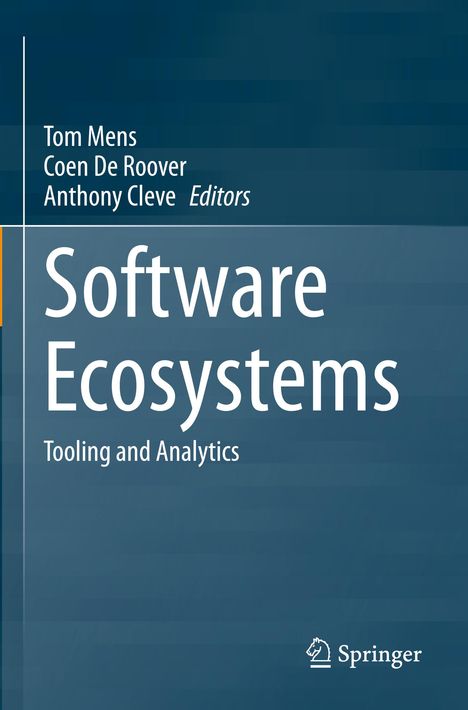Software Ecosystems, Kartoniert / Broschiert
Software Ecosystems
- Tooling and Analytics
(soweit verfügbar beim Lieferanten)
- Herausgeber:
- Tom Mens, Anthony Cleve, Coen de Roover
- Verlag:
- Springer International Publishing, 10/2024
- Einband:
- Kartoniert / Broschiert, Paperback
- Sprache:
- Englisch
- ISBN-13:
- 9783031360626
- Artikelnummer:
- 11996061
- Umfang:
- 336 Seiten
- Nummer der Auflage:
- 2023
- Ausgabe:
- 2023
- Gewicht:
- 511 g
- Maße:
- 235 x 155 mm
- Stärke:
- 19 mm
- Erscheinungstermin:
- 6.10.2024
- Hinweis
-
Achtung: Artikel ist nicht in deutscher Sprache!
Weitere Ausgaben von Software Ecosystems |
Preis |
|---|
Klappentext
This book highlights recent research advances in various domains related to software ecosystems such as library reuse, collaborative development, cloud computing, open science, sentiment analysis and machine learning. A key aspect of software ecosystems is that software products belong to ever more interdependent networks of co-evolving software components. The ever-increasing importance of social coding platforms has made software ecosystems indispensable to software practitioners, in commercial as well as open-source settings. The book starts with an introductory chapter that provides a historical account of the origins of software ecosystems. It provides the necessary context about the domain of software ecosystems by highlighting its different perspectives, definitions, and representations. It also exemplifies the variety of software ecosystems that have emerged during the previous decades. The remaining book is composed of five parts: Part I contains two chapters on software ecosystem representations, Part II two chapters that focus on complementary ways and techniques of analyzing software ecosystems. Next, Part III includes two chapters that focus on aspects related to the evolution within software ecosystems, while Part IV looks at workflow automation and infrastructure-as-code ecosystems. Finally, Part V focuses on ecosystems for software modeling and for data-intensive software. This book is intended for researchers and practitioners interested in data mining, tooling, and empirical analysis of software ecosystems. The reader will appreciate chapters that cover a wide spectrum of social and technical aspects of software ecosystems, each including an overview of the state of the art. Chapter 2 The Software Heritage Open Science Ecosystem is available open access under a Creative Commons Attribution 4.0 International License via link. springer. com.

